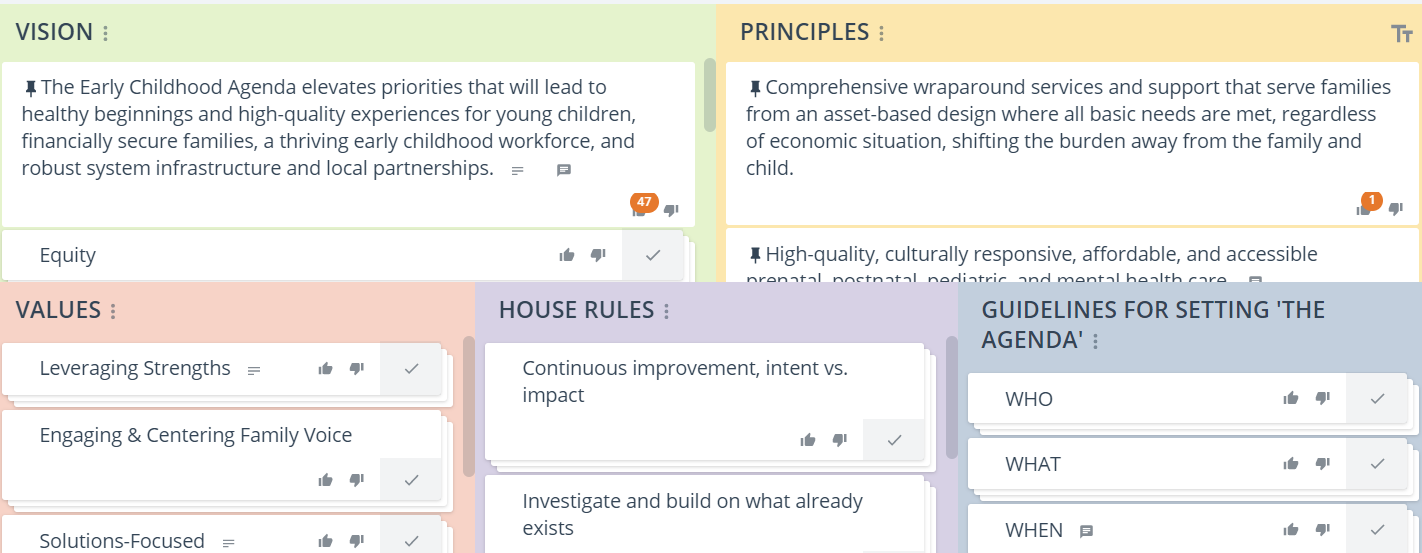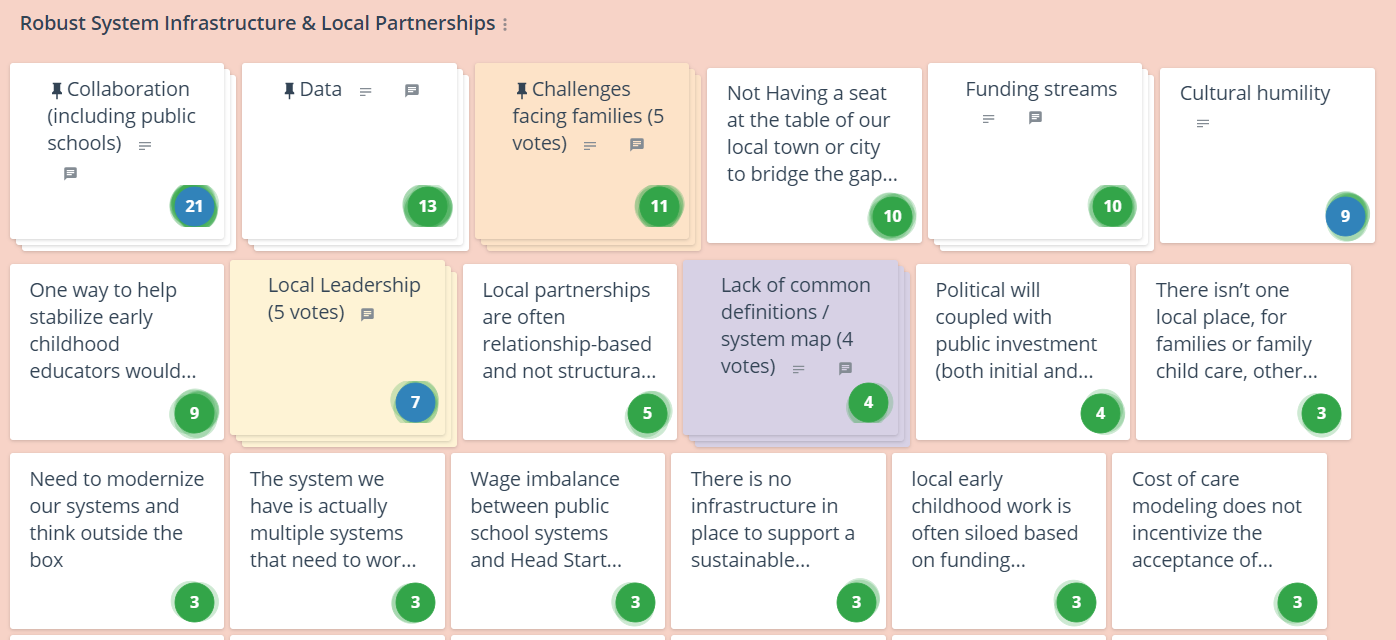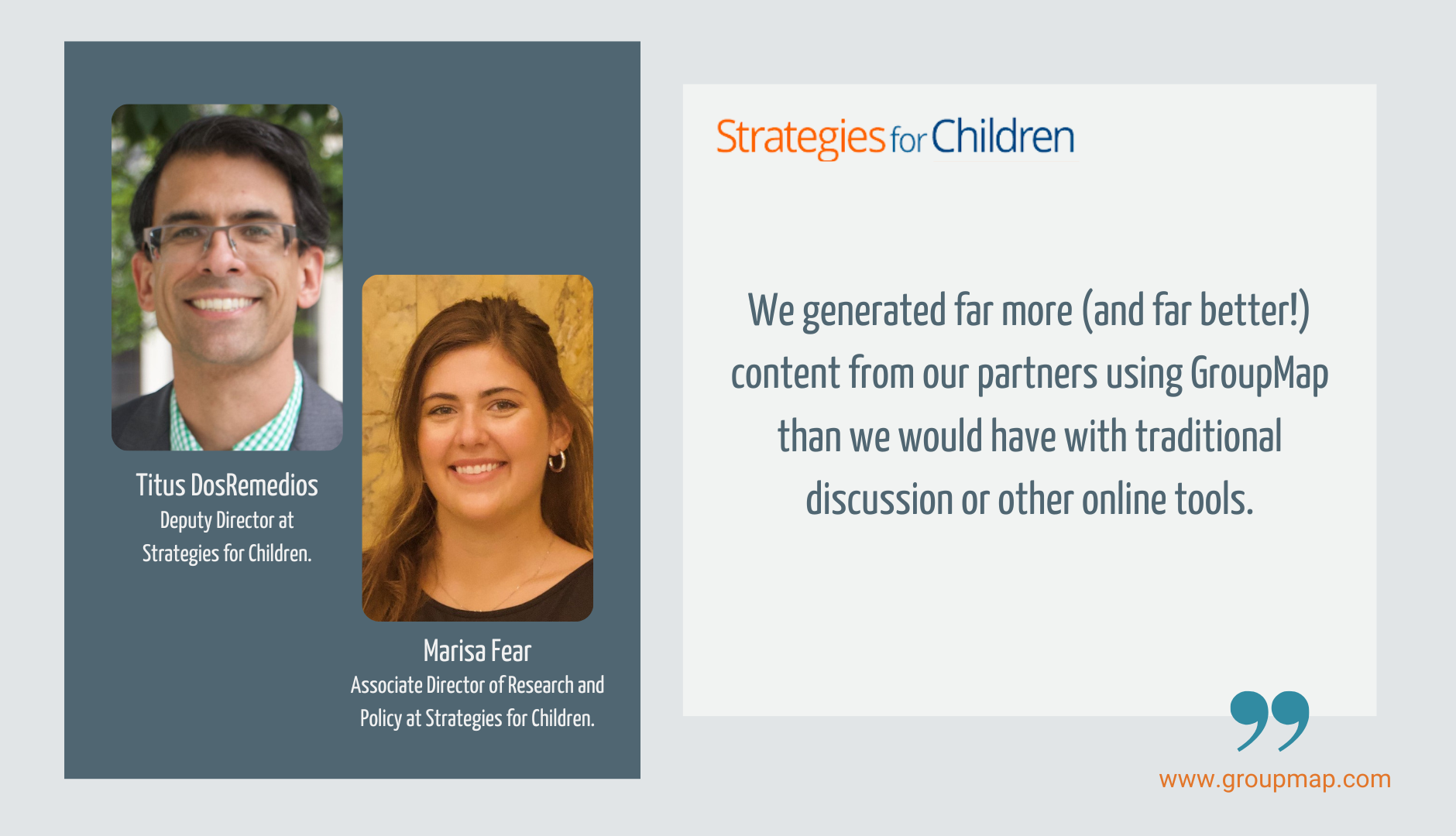Non-profit, Strategies for Children needed to collaborate with their community to deliver on their ambitious strategic plan. To do so, they included GroupMap in their tool kit to help them build their roadmap toward an integrated and accessible system of support.
Titus DosRemedios and Marisa Fear share how they used GroupMap and the change it helped to deliver.
Who we are
Strategies for Children (SFC) is a small nonprofit organization based in Boston, Massachusetts (USA). It works to ensure that Massachusetts invests the resources needed for all children, from birth to age five, to access high-quality early education programs that prepare them for success in school and life.
We focus on state policy, and work with coalitions, grassroots advocates, state agency partners, researchers, and philanthropy to achieve systemic change.
We needed to build a roadmap
In our four-year strategic plan adopted in 2021, we were charged with taking our advocacy work to the next level. By convening all early childhood partners in our state to create a unified agenda for early childhood, that would result in systemic change for more positive outcomes for young children, families, communities, and early childhood professionals.
To achieve this, we launched the Early Childhood Agenda in October 2022.
The COVID-19 pandemic shone an important light on the early childhood ecosystem in Massachusetts and created opportunities for systemic change. Early childhood issues are interdependent and can’t be developed effectively in silos.
The Early Childhood Agenda was conceived as a series of convenings, taking a whole-child approach, working across sectors for better policy development and to identify effective solutions that may not be visible from one sector’s viewpoint.
Together, we would build a roadmap – an Early Childhood Agenda to ensure that Massachusetts has an integrated and accessible system of support for children from prenatal through age eight and their families.
Why we chose GroupMap
The Early Childhood Agenda convenings were virtual – held on Zoom over six meetings, with working groups engaged in content creation during and between meetings.
There were more than 150 active participants, and a larger community of 400 interested partners.
Our team realized very early on that we would need new tools to effectively communicate, collaborate, and prioritize ideas.
We chose BaseCamp for a virtual home-base of operations, including archived meeting videos and discussion threads.
We then chose GroupMap as the primary tool and platform for our Agenda content creation. We had experimented with Google docs and sheets, Jamboard, and other tools for allowing multiple participants to generate content during Zoom meetings. We liked GroupMap’s features, layout, and settings, and decided to try GroupMap for this project.
We hosted 100 attendees at our first Early Childhood Agenda convening on Zoom. We used GroupMap to review and edit Vision, Principles, Values, House Rules, and Guidelines (see below)

Our audience of participants responded well to GroupMap, so we felt comfortable using it again at subsequent meetings.
For the second and third meetings we broke into five themed working groups, and each developed a GroupMap of the top challenges in our field. Our staff pre-populated the GroupMaps with initial examples, then all attendee participants joined the GroupMap to type in their own ideas.
Brainstorming was very successful, and led to grouping, reviewing, editing, then voting. This took place over subsequent meetings and in-between meetings, prompted by emails and BaseCamp instructions.

In the final meeting, we went into working groups again, to discuss solutions. Our team pre-populated these GroupMaps with solutions that corresponded to the top vote-getting challenges from the previous GroupMap. They also pre-populated a few ideas for “lead advocates / state partners” in the bottom row. Then in the meeting, participants added their own ideas.
As you can see from the examples above, we enjoyed all aspects of GroupMap, especially brainstorming and voting.
GroupMap as a meeting facilitation tool
We wanted our participants to feel heard, valued, empowered, and that they are making active contributions to the discussion and the overall process. This is much harder in traditional meeting settings where only a few people get to speak.
With GroupMap, everyone can make their contribution simultaneously, and even offline after the meeting ends.
People who join the process late can catch up, and we have an archive for future reference.
GroupMap allowed us to meaningfully engage with a much larger audience than we ever had in previous convenings.
The Early Childhood Agenda project required substantial community brainstorm, review, debate, voting, and consensus.
GroupMap enabled us to effectively meet our goals at each step of the process. We had a quick 3-month project timeline: October – December, 2022. GroupMap allowed us to accomplish all our goals and reduced the amount of staff time it would have taken to facilitate this process using other methods.
Our team at Strategies for Children achieved the impossible – building a cohesive community of early childhood advocates online using Zoom, BaseCamp, and of course GroupMap.
We generated far more (and far better!) content from our partners using GroupMap than we would have with traditional discussion or other online tools.
Thank you GroupMap team for creating this innovative product. Nonprofit organizations, advocacy coalitions, and other community conveners will find GroupMap an essential tool in their toolkit for achieving social change.
Thanks to our writers –
Titus DosRemedios, Deputy Director at Strategies for Children. Titus manages the internal team, contractors, and interns, as well as supports fundraising, policy and advocacy, and external partnerships.
Marisa Fear, Associate Director of Research and Policy at Strategies for Children. Marisa is the project manager for the Early Childhood Agenda, and leads early childhood policy, research, and data analytics.
